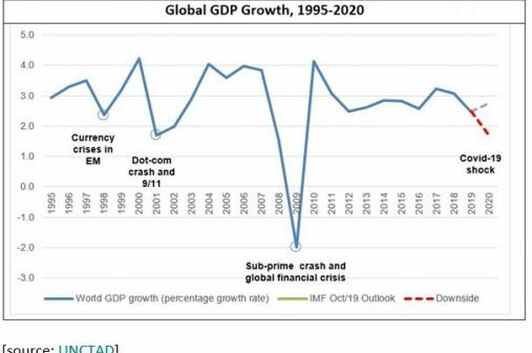Why India Has a Chance to Replace China as Global Economic Leader Post Coronavirus Crisis
“Once the pandemic is brought under control, India must actively engage in rebuilding the world economy.”
Just a couple of months ago, it was business as usual. The world economy was moving on predicted trajectories and then patient zero in Wuhan chowed on an infected wild animal, giving Covid-19 the evolutionary jumpstart any species could only dream of. It also gave researchers an opportunity to use this massive shock to rethink everything from evaluating public health preparedness to global supply chains of goods and services.
This global pandemic of Covid-19 helps us in questioning the inevitable rise of China, not just as an economic but also geo-political power. The Chinese government claims to have contained the virus and is starting to help other countries during the crisis. However, it is their myopic thinking riddled with a characteristic lack of transparency that has brought the world to a standstill in just a span of a few weeks.
Figure 1: The coronavirus outbreak could cost the global economy up to $2 trillion this year
China had geo-political and hegemonic motives. All knew and all chose to ignore. Lack of transparency and lax labour laws made workers who were often forced to migrate from their villages in millions slog in massive assembly lines of factories without much choice. All voices of concern were drowned in politico-economic justifications of an unchecked capitalist system driven by invisible hand.
World order stands to change due to Covid-19. Even assuming erratic pandemics do not recur, what is clear is that the Chinese government’s totalitarianism and lack of transparency will continue to hurt us. Today it is Covid-19, tomorrow it may be their financial system – we don’t know. What is clear is that putting all eggs in one basket and shifting 80% of supply chains to China just on considerations of profit was myopically unsustainable. We all have now observed Chinese authority’s deliberate attempt to hide a preventable crisis and consequent repercussions across the world markets. And that is the fundamental problem with closed regimes with regulated public discourse. It helps in creation of a convoluted informational flow which will inevitably crash and burn.
China has always aspired to exert greater influence in international agencies like UN and increase its military and economic footprint across the world. It was constrained to do that by helping states like Pakistan and was the “other” side to a liberal and inclusivist geo-political normal. It has made a quick move to become the new “normal” taking advantage of crisis and posing as a messiah in fight against self-generated killer pandemic. China is moving in space created by acute need for help for medical assistance and supplies, as other countries are unable to fill that gap.
The current crisis also harbors the risk for the world order to go entirely in the hands of rhetorical nationalists whose theories of trade sanctions are based more on populist considerations than reason. There needs to be balance. Philosophically, nature has forcibly reset our choices and placed us at crossroads where the way ahead involves re-establishing the status quo or evolve into a system where no one is more equal than the other and power is not concentrated in the hands of a few. The latter is by far superior.
In this context, India is very well positioned to help build a more dynamic and sustainable world. Based on the Global Competitiveness Index, India is the most competitive country in South Asia. India has a competitive advantage in the services including the Information Technology Services, Pharmaceuticals, Biotechnology, and Medical tourism sectors. Right now, it is particularly ripe for market reforms in view of solid platform created by Make in India and Invest India initiatives of Prime Minister Narendra Modi. Other factors going in our favor are:
Declining Chinese Growth: A recent report by the United Nations Conference on Trade and Development suggests that there could be a 2% reduction in annualised exports
Decreasing Global Demand: There is also going to be a decreased global demand resulting in cheap raw materials which could be used for capacity building. This is a really good time to give substantial financial incentives for investors searching for safe investments and build economic capacity.
Political Support: With a faltering economy, the appetite for economic reform would be higher. India is in desperate need for structural reforms and COVID-19 could be very helpful for political posturing of reforms. As President Obama’s former chief of staff, Rahm Emanuel, once said “never let a crisis go to waste.”
China’s Reliability Crisis: The Covid-19 has brought about a clear reliability crisis for the Chinese government. Investors will certainly reconsider if it is wise to invest in a country known for its shoddy transparency.
Potential to Grow: India has massive potential to grow. Just 35 years ago, the Indian and Chinese economy had similar exports. The Chinese economy experienced massive growth, in part, due to substantial market friendly reforms. If a communist country which doesn’t speak English or share little values with western world can serve the world economy, so can India.
Figure 3: Total Exports of Goods and Services in Current US Dollars
We stand to gain through our Make in India and allied initiatives. Commendable job has been done to offer ease of doing business to investors, reducing rent seeking and ensuring transparency. However, lots needs to be done to cover large ground very quickly.
Land and labour reforms are certainly key aspects to it. India needs to have more market friendly land and labour laws with adequate safeguards to protect individual freedoms. Its administration services are understaffed at the upper levels relative to its population leading to excessive stress, possible reductions in speed of bureaucratic service and concentration of power.
Its regulatory regime still involves jumping through multiple hoops. The emergence of single window clearance system is a great positive which needs to be rapidly expanded in both scope and scale. To attain investors’ confidence, Parliament should consider laws which would help prevent decisions like retrospective taxation on Vodafone.
India also looks at economic slowdown due to the pandemic. Once the pandemic is brought under control, India must actively engage in rebuilding the world economy. The world must think beyond naked profit and look to shift manufacturing and sourcing the services to a democratic and competitive nation which guarantees basic freedoms, is committed to reforms and can continuously adapt and innovate to changing global market needs. That is the essential economic take away from the catastrophic disruption of supply chains due to Covid-19 pandemic.
We cannot predict the recurrence of such drastic external shocks, but we know these processes carry a non-zero probability. Such events carry risk of annihilation warranting an all-out, no-prisoner-taken approach as per precautionary principle. To account for uncertainty in the face of possible irreversible catastrophe, world needs to prepare for the worst-case scenario. Unhinged reliance on a totalitarian state for supply of essential commodities need a completely rational and new look.
Disclaimer: Allocation of resources to public health machinery to fight Covid-19 pandemic is the foremost necessity. Strategic thinking on economy especially trade must be for a post containment scenario with long term objectives.
Mrinalini Darswal
(The author is a doctor and IAS officer who has worked as special secretary, Health, Commissioner Food Safety, Drug Controller, and project director for HIV/AIDS control for Delhi Government. Views expressed are personal.)
Source : News18






